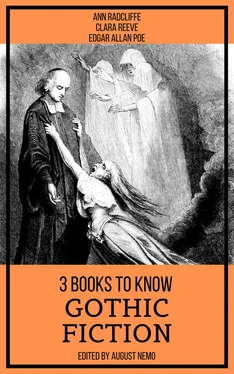Julia, resigning herself to despair, indulged in solitude the excess of her grief. A calamity, so dreadful as the present, had never before presented itself to her imagination. The union proposed would have been hateful to her, even if she had no prior attachment; what then must have been her distress, when she had given her heart to him who deserved all her admiration, and returned all her affection.
The Duke de Luovo was of a character very similar to that of the marquis. The love of power was his ruling passion; — with him no gentle or generous sentiment meliorated the harshness of authority, or directed it to acts of beneficence. He delighted in simple undisguised tyranny. He had been twice married, and the unfortunate women subjected to his power, had fallen victims to the slow but corroding hand of sorrow. He had one son, who some years before had escaped the tyranny of his father, and had not been since heard of. At the late festival the duke had seen Julia; and her beauty made so strong an impression upon him, that he had been induced now to solicit her hand. The marquis, delighted with the prospect of a connection so flattering to his favorite passion, readily granted his consent, and immediately sealed it with a promise.
Julia remained for the rest of the day shut up in her closet, where the tender efforts of Madame and Emilia were exerted to soften her distress. Towards the close of evening Ferdinand entered. Hippolitus, shocked at her absence, had requested him to visit her, to alleviate her affliction, and, if possible, to discover its cause. Ferdinand, who tenderly loved his sister, was alarmed by the words of Hippolitus, and immediately sought her. Her eyes were swelled with weeping, and her countenance was but too expressive of the state of her mind. Ferdinand’s distress, when told of his father’s conduct, was scarcely less than her own. He had pleased himself with the hope of uniting the sister of his heart with the friend whom he loved. An act of cruel authority now dissolved the fairy dream of happiness which his fancy had formed, and destroyed the peace of those most dear to him. He sat for a long time silent and dejected; at length, starting from his melancholy reverie, he bad Julia good-night, and returned to Hippolitus, who was waiting for him with anxious impatience in the north hall.
Ferdinand dreaded the effect of that despair, which the intelligence he had to communicate would produce in the mind of Hippolitus. He revolved some means of softening the dreadful truth; but Hippolitus, quick to apprehend the evil which love taught him to fear, seized at once upon the reality. ‘Tell me all,’ said he, in a tone of assumed firmness. ‘I am prepared for the worst.’ Ferdinand related the decree of the marquis, and Hippolitus soon sunk into an excess of grief which defied, as much as it required, the powers of alleviation.
Julia, at length, retired to her chamber, but the sorrow which occupied her mind withheld the blessings of sleep. Distracted and restless she arose, and gently opened the window of her apartment. The night was still, and not a breath disturbed the surface of the waters. The moon shed a mild radiance over the waves, which in gentle undulations flowed upon the sands. The scene insensibly tranquilized her spirits. A tender and pleasing melancholy diffused itself over her mind; and as she mused, she heard the dashing of distant oars. Presently she perceived upon the light surface of the sea a small boat. The sound of the oars ceased, and a solemn strain of harmony (such as fancy wafts from the abodes of the blessed) stole upon the silence of night. A chorus of voices now swelled upon the air, and died away at a distance. In the strain Julia recollected the midnight hymn to the virgin, and holy enthusiasm filled her heart. The chorus was repeated, accompanied by a solemn striking of oars. A sigh of exstacy stole from her bosom. Silence returned. The divine melody she had heard calmed the tumult of her mind, and she sunk in sweet repose.
She arose in the morning refreshed by light slumbers; but the recollection of her sorrows soon returned with new force, and sickening faintness overcame her. In this situation she received a message from the marquis to attend him instantly. She obeyed, and he bade her prepare to receive the duke, who that morning purposed to visit the castle. He commanded her to attire herself richly, and to welcome him with smiles. Julia submitted in silence. She saw the marquis was inflexibly resolved, and she withdrew to indulge the anguish of her heart, and prepare for this detested interview.
The clock had struck twelve, when a flourish of trumpets announced the approach of the duke. The heart of Julia sunk at the sound, and she threw herself on a sopha, overwhelmed with bitter sensations. Here she was soon disturbed by a message from the marquis. She arose, and tenderly embracing Emilia, their tears for some moments flowed together. At length, summoning all her fortitude, she descended to the hall, where she was met by the marquis. He led her to the saloon in which the duke sat, with whom having conversed a short time, he withdrew. The emotion of Julia at this instant was beyond any thing she had before suffered; but by a sudden and strange exertion of fortitude, which the force of desperate calamity sometimes affords us, but which inferior sorrow toils after in vain, she recovered her composure, and resumed her natural dignity. For a moment she wondered at herself, and she formed the dangerous resolution of throwing herself upon the generosity of the duke, by acknowledging her reluctance to the engagement, and soliciting him to withdraw his suit.
The duke approached her with an air of proud condescension; and taking her hand, placed himself beside her. Having paid some formal and general compliments to her beauty, he proceeded to profess himself her admirer. She listened for some time to his professions, and when he appeared willing to hear her, she addressed him —‘I am justly sensible, my lord, of the distinction you offer me, and must lament that respectful gratitude is the only sentiment I can return. Nothing can more strongly prove my confidence in your generosity, than when I confess to you, that parental authority urges me to give my hand whither my heart cannot accompany it.’
She paused — the duke continued silent. —’’Tis you only, my lord, who can release me from a situation so distressing; and to your goodness and justice I appeal, certain that necessity will excuse the singularity of my conduct, and that I shall not appeal in vain.’
The duke was embarrassed — a flush of pride overspread his countenance, and he seemed endeavouring to stifle the feelings that swelled his heart. ‘I had been prepared, madam,’ said he, ‘to expect a very different reception, and had certainly no reason to believe that the Duke de Luovo was likely to sue in vain. Since, however, madam, you acknowledge that you have already disposed of your affections, I shall certainly be very willing, if the marquis will release me from our mutual engagements, to resign you to a more favored lover.’
‘Pardon me, my lord,’ said Julia, blushing, ‘suffer me to’—‘I am not easily deceived, madam,’ interrupted the duke — ‘your conduct can be attributed only to the influence of a prior attachment; and though for so young a lady, such a circumstance is somewhat extraordinary, I have certainly no right to arraign your choice. Permit me to wish you a good morning.’ He bowed low, and quitted the room. Julia now experienced a new distress; she dreaded the resentment of the marquis, when he should be informed of her conversation with the duke, of whose character she now judged too justly not to repent the confidence she had reposed in him.
The duke, on quitting Julia, went to the marquis, with whom he remained in conversation some hours. When he had left the castle, the marquis sent for his daughter, and poured forth his resentment with all the violence of threats, and all the acrimony of contempt. So severely did he ridicule the idea of her disposing of her heart, and so dreadfully did he denounce vengeance on her disobedience, that she scarcely thought herself safe in his presence. She stood trembling and confused, and heard his reproaches without the power to reply. At length the marquis informed her, that the nuptials would be solemnized on the third day from the present; and as he quitted the room, a flood of tears came to her relief, and saved her from fainting.
Читать дальше












